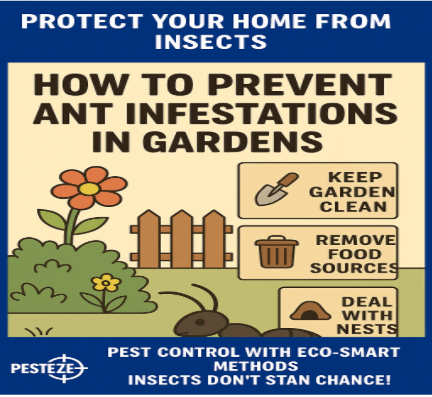STOP ANTS FROM TAKING OVER YOUR GARDEN – SIMPLE, EFFECTIVE SOLUTIONS!

STOP ANTS FROM TAKING OVER YOUR GARDEN – SIMPLE, EFFECTIVE SOLUTIONS!
Summary
Ants may seem harmless, but when they infest your garden, they can damage plants, encourage pests like aphids, and disrupt the soil balance. Learning how to prevent ant infestations naturally and effectively will help protect your garden and keep your plants thriving.
Features
-
Identify Ant Hotspots
• Discover where ants are nesting in your garden before taking action. -
Use Natural Repellents
• Apply safe solutions like vinegar, cinnamon, and diatomaceous earth. -
Eliminate Food Sources
• Remove fallen fruits, sweet residues, and pet food that attract ants. -
Encourage Natural Predators
• Ladybugs, spiders, and birds help reduce ant populations. -
Disrupt Trails & Nests
• Break pheromone trails with soapy water or essential oils. -
Practice Preventive Maintenance
• Keep your soil healthy, prune plants, and check for ant colonies regularly.
Guide Description (400 words)
Ants play an important role in nature, but in your garden, they can quickly become destructive. They protect pests like aphids and mealybugs, which damage plants, and their colonies can disturb soil and root systems. The good news is, preventing ant infestations in gardens doesn’t require harmful chemicals—natural, eco-friendly methods work just as well.
The first step is identifying ant hotspots. Look for ant trails leading to plants, nests in the soil, or signs of activity around compost piles and shaded areas. Once you know where ants are concentrated, you can focus your efforts more effectively.
Next, use natural repellents. Diatomaceous earth is a safe powder that dehydrates ants on contact. Sprinkling cinnamon, coffee grounds, or cayenne pepper around plants can also discourage ants. A simple mixture of vinegar and water sprayed along ant trails breaks their pheromone paths, making it harder for them to regroup.
Equally important is eliminating food sources. Ants are drawn to sweet and sugary substances. Regularly clean up fallen fruits, sugary residues, or even pet food left outside. If ants are farming aphids for honeydew, treat the aphid problem directly with neem oil or insecticidal soap.
Another smart approach is to encourage natural predators. Ladybugs, lacewings, and certain birds are natural enemies of both ants and the pests they protect. Planting nectar-rich flowers can help attract these beneficial insects to your garden.
To tackle existing infestations, disrupt their trails and nests. Pour boiling water (carefully) into visible nests or use essential oils like peppermint or tea tree oil mixed with water as a spray. These break down ant communication systems and force colonies to relocate.
Finally, practice preventive maintenance. Keep your garden tidy by pruning overgrown plants, maintaining soil health, and regularly checking for new ant activity. By being proactive, you can keep ants at bay before they become a larger issue.
With consistent effort, these natural and simple methods will help protect your garden from ant infestations and keep it flourishing year-round.
- Devansh Subbagari


Comments 0